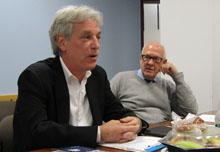Event
Effective use of social media will determine 2012 election, says Rory O’Connor

October 9, 2012 – Former Fellow Rory O’Connor joined the Shorenstein Center for a discussion about how social media has influenced politics and traditional media. O’Connor, a filmmaker and journalist, is the author of Friends, Followers and the Future: How Social Media are Changing Politics, Threatening Big Brands, and Killing Traditional Media.
Tracing social media’s “disruption” of politics from its earliest moments, O’Connor pointed out that even before Facebook and Twitter were invented, the blogosphere had a tremendous impact on political campaigns, including Bill Bradley’s and John McCain’s in 1999-2000, as well as Howard Dean’s in 2003.
But Barack Obama was the first successful presidential candidate that “totally embraced the Internet” and used social networks to raise “record-breaking amounts of money,” O’Connor said. And beyond fundraising, Obama “used new media to circumvent long-standing media political brands by communicating with his supporters directly,” through an extensive email campaign. His effective use of social media “secured him the nomination and was responsible for him becoming the president,” O’Connor argued.
As for the upcoming 2012 election, O’Connor said that the candidate “who gets the changes in communication and media technologies is almost inevitably going to be the winner,” and so he believes “Obama is more likely to succeed in 2012.” However, “both sides are making a lot of mistakes in the way that they apply social media,” O’Connor pointed out, and in Obama’s case, those mistakes “could be the critical factor in his defeat.”
Looking forward, O’Connor says he is “optimistic” about the future of journalism, media and politics because he sees the emerging of a more engaged, democratic, participatory citizenry. Instead of using negative television ads that “talk at” the audience and encourage citizens not to vote, O’Connor suggested that candidates should use social media platforms to “talk with” and engage citizens in conversation.
Article and photos by Janell Sims, Shorenstein Center.